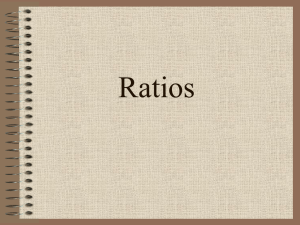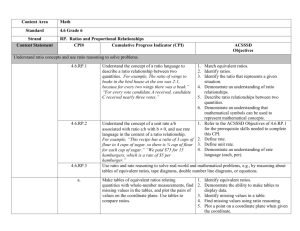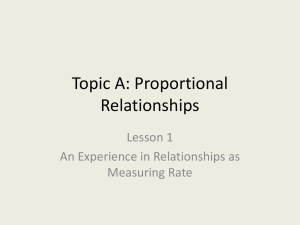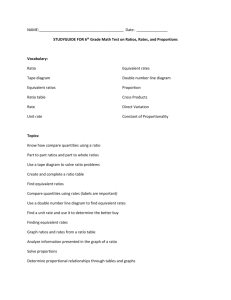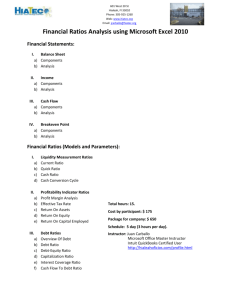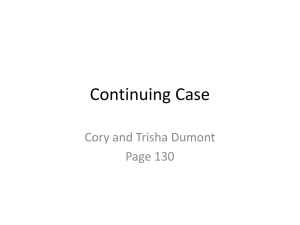DRAFT%20Sample%20Capstone%20Lesson%20Plan
advertisement
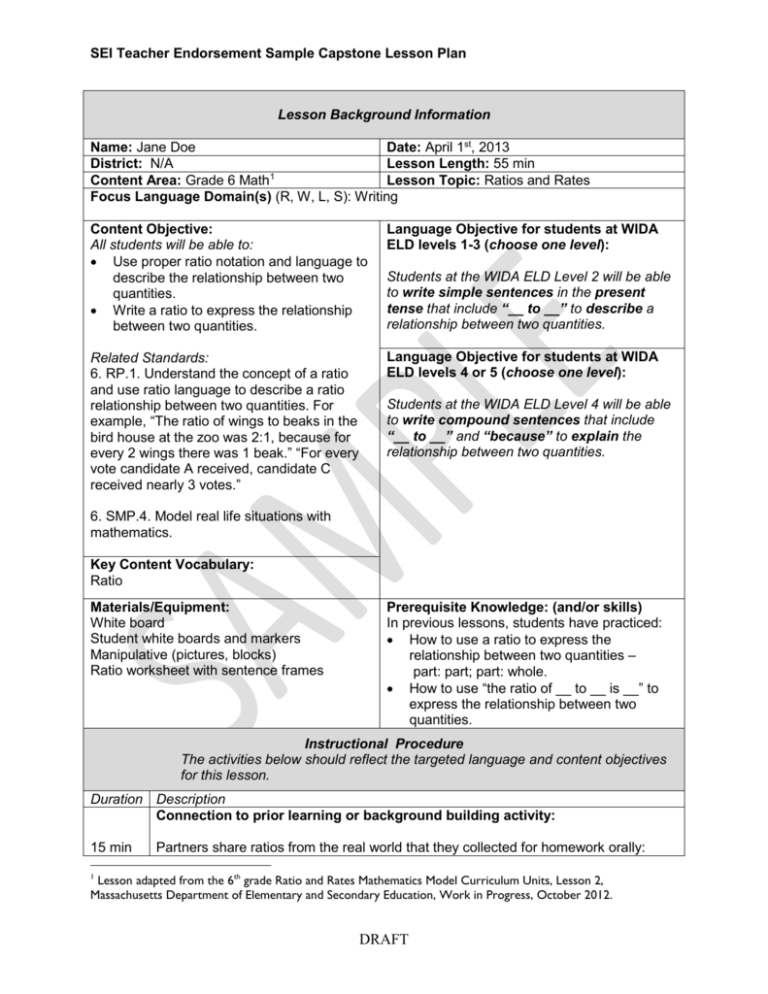
SEI Teacher Endorsement Sample Capstone Lesson Plan Lesson Background Information Name: Jane Doe Date: April 1st, 2013 District: N/A Lesson Length: 55 min Content Area: Grade 6 Math1 Lesson Topic: Ratios and Rates Focus Language Domain(s) (R, W, L, S): Writing Content Objective: All students will be able to: Use proper ratio notation and language to describe the relationship between two quantities. Write a ratio to express the relationship between two quantities. Language Objective for students at WIDA ELD levels 1-3 (choose one level): Related Standards: 6. RP.1. Understand the concept of a ratio and use ratio language to describe a ratio relationship between two quantities. For example, “The ratio of wings to beaks in the bird house at the zoo was 2:1, because for every 2 wings there was 1 beak.” “For every vote candidate A received, candidate C received nearly 3 votes.” Language Objective for students at WIDA ELD levels 4 or 5 (choose one level): Students at the WIDA ELD Level 2 will be able to write simple sentences in the present tense that include “__ to __” to describe a relationship between two quantities. Students at the WIDA ELD Level 4 will be able to write compound sentences that include “__ to __” and “because” to explain the relationship between two quantities. 6. SMP.4. Model real life situations with mathematics. Key Content Vocabulary: Ratio Materials/Equipment: White board Student white boards and markers Manipulative (pictures, blocks) Ratio worksheet with sentence frames Prerequisite Knowledge: (and/or skills) In previous lessons, students have practiced: How to use a ratio to express the relationship between two quantities – part: part; part: whole. How to use “the ratio of __ to __ is __” to express the relationship between two quantities. Instructional Procedure The activities below should reflect the targeted language and content objectives for this lesson. Duration Description Connection to prior learning or background building activity: 15 min Partners share ratios from the real world that they collected for homework orally: 1 Lesson adapted from the 6th grade Ratio and Rates Mathematics Model Curriculum Units, Lesson 2, Massachusetts Department of Elementary and Secondary Education, Work in Progress, October 2012. DRAFT SEI Teacher Endorsement Sample Capstone Lesson Plan 15 min Teacher models sharing a ratio from the real world: “There are 6 boys and 7 girls in the class. The ratio of boys to girls is 6:7” Teacher pairs ELD level 2 students with ELD level 4 or native speakers. Students turn and talk to a partner to share one example ratio they brought as homework. They use the sentence frame that the teacher modeled with their partner. Then the pair chooses one ratio to share with the class. Teacher asks one student in the pair to highlight the quantities compared (“There are 6 boys and 7 girls in the class”) and the second student to express it as a ratio (“The ratio of boys to girls is 6:7”). Activities, resources, and materials to present new content area AND language knowledge or skill: Teacher explains how to write a ratio writing underlined sentences on the board as he/she explains them: You can use “__ to __” to write a ratio that compares two quantities. To compare the boys to girls, you can write “The ratio of boys to girls is 6 to 7”. To compare the boys to all students (total number of students) you can write “The ratio of boys to the class is 6 to 13”. Teacher models how to write a ratio based on a picture of a scattered arrangement that has components labeled: With this picture, you can make a part to part ratio and write “The ratio of starfish to snails is 2 to 3” (teacher points to starfish and snails when saying those words) Teacher asks students to write another part to part ratio on an individual white board and lift it up when they are done. Teacher models how to write another ratio based on a picture of a scattered arrangement that has components labeled: With this picture you can make a part to whole ratio and write “The ratio of starfish to all the animals is 2 to 32.” Teacher asks students to write another part to whole ratio on an individual white board and lift it up when they are done. Teacher models how to explain what ratios mean: It’s very important to explain what your ratios mean. To explain your ratios you have to tell me what quantities you compared. To explain a ratio, I can write: “The ratio of dark parts to the total number of parts is 5:10 because there are 5 dark parts and 10 total parts.” (Teacher DRAFT SEI Teacher Endorsement Sample Capstone Lesson Plan writes the sentence on the board and point to the dark parts and circle the total parts when speaking) Students work in partners to write new ratios and explain them using the sentence frame on the board. Students write on white boards and show up their ratios when they are finished. Teacher circulates to help ELD level 2 students. 15 min Activities, resources, and materials to PRACTICE new content area AND language knowledge or skill: Students practice writing ratios based on different types of ratio problems in a worksheet given by the teacher. ELD level 2 students work on writing ratios and interpreting the prompts based on their knowledge of how to write a ratio. Their worksheet has a sentence frame with a sample ratio using “__ to ___” and labeled pictures and/or illustrated word bank. ELD level 4 students work on writing ratios and explaining their ratios. Their worksheet has the following sentence frame: “The ratio of __ to __ is __:___ because there are __ _______ and__ _______” and a completed model. Ratio Problem Types: 1. Pictures of objects in scattered arrangements with questions that include: part: whole ratios - Write a ratio to compare the number of ____ to the total number of ______ in the picture. part: part ratios - Write a ratio to compare the number of ___ to ____ in the picture. Sample picture arrangement 2. Working backward: In the diagram, the ratio ___:___ shows there are __ ________ and ___ __________. 3. Shapes divided into equal parts with some parts shaded: Write a ratio for the dark parts to the white parts; Write a ratio for the dark parts to the total. DRAFT SEI Teacher Endorsement Sample Capstone Lesson Plan 10 min Activities, resources, and materials to ASSESS new content area AND language knowledge or skill: Students write ratios based on different types of ratio problems in a worksheet given by the teacher. ELD level 2 students write ratios and interpret the prompts based on their knowledge of how to write a ratio. Their worksheet has a sentence frame with a sample ratio using “__ to ___” and labeled pictures and/or illustrated word bank. ELD level 4 students write ratios and explain their ratios. Their worksheet has the following sentence frame: “The ratio of __ to __ is __:___ because there are __ _______ and__ _______” and a completed model. Ratio Problem Types: 1. Pictures of objects in scattered arrangements with questions that include: part: whole ratios - Write a ratio to compare the number of ____ to the total number of ______ in the picture. part: part ratios - Write a ratio to compare the number of ___ to ____ in the picture. 2. Working backward: In the diagram, the ratio ___:___ shows there are __ ________ and ___ __________. 3. Shapes divided into equal parts with some parts shaded: Write a ratio for the dark parts to the white parts; Write a ratio for the dark parts to the total. Homework/Extension Activities 1. Students find 3 examples of ratios in the real world. They can be on the internet, in newspapers, or in their own homes. For each, they write down the ratio in the proper format. 2. Students create a ratio problem for a classmate to solve. Include pictures of objects, the question (what ratio the student wants the solver to find), and the form in which the student wants the ratio written DRAFT

